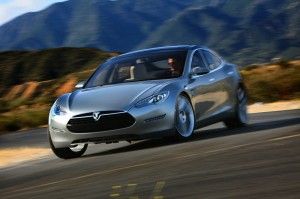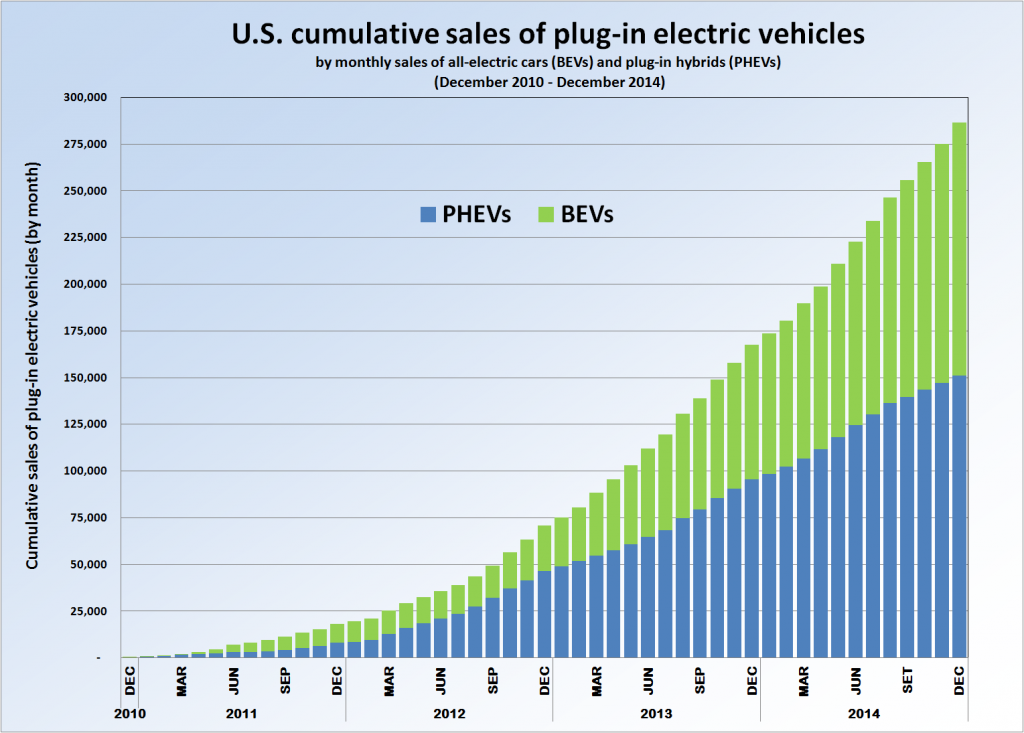Electric vehicle sales survive low gas prices — so far
 Call it the Tesla Effect.
Call it the Tesla Effect.
Good news — so far — for California’s successful electric-vehicle maker and others in the industry. At least through last November, the low gasoline prices of recent months have not crashed electric vehicle sales.
Plug In America, which follows EV sales, charted both sales and the price of gas for recent years. “Gasoline prices have fluctuated almost a dollar during this period,” it found. “Very recently, they’ve dipped to new lows. But on average, the trend has been flat, because all the ups and downs cancel each other out.”
The chart on their site shows national gas prices jumping up and down from 2011 through Nov. 2014, from lows of around $3 a gallon to highs of nearly $4. California prices have been about 10 percent to 15 percent higher than national prices.
“The current generation of plug-in vehicles started selling in December 2010,” Plug In America also reported. “As a product category, PEVs [plug-in electric vehicles] are still in their infancy. Sales have risen year after year. The trend is rising.”
EV sales
The chart on that site shows sales of EVs steadily rising from close to zero at the beginning of 2011 to about 10,000 a month at the end of 2014. Here’s a similar chart:

However, a caution light comes from Robert Poole, director of transportation policy at the Los Angeles-based Reason Foundation. “We are now seeing gas prices far below the data for 2013 and 2014, so all bets are off in terms of the impact on hybrid and EV sales impact,” he told CalWatchdog.com.
“The auto industry is already seeing a large increase in pickup truck and SUV sales, which is widely attributed to the impact of lower gas prices,” he said. “I would be very surprised if there were not a comparable impact, in the other direction, on sales of hybrids and EVs.”
Long-term data to come out in future months will tell the story.
But USA Today reported this week:
“Sales of new cars and trucks roared off to a fast start in January, towed by Americans’ renewed love affair with trucks and SUVs as low fuel prices mean the gas-thirsty models aren’t so expensive to fill up.
“Trucks — a category that consists of pickups, vans and SUVs — were 54% of January sales; cars were the remainder, according to sales tracker Autodata.”
One detail can be noted, for Fiat Chrysler Automobiles. Its Chrysler division went bankrupt during the Great Recession, was bailed out by the federal government, then merged with Fiat. The picture now:
“Jeep, again, was the star, posting its best-ever monthly sales and recording a 44% increase by the compact Jeep Cherokee SUV.
“Patriot, smaller than Cherokee and on the market since the 2007 model, found new buyers somewhere, and recorded a 35.6% gain.
“Ram pickup was up 14%.
“Chrysler has become largely a truck and SUV company — 72.5% of its sales — while its cars are an almost incidental 27.5%.
“Even against the industry-wide strong, new interest in trucks and SUVs, FCA US results are dramatic.”
The future
These numbers likely only would hold so long as gas prices remain low. If the history of fluctuations once more arcs upward, then gas-powered vehicles again could come into disfavor.
The San Jose Mercury News reported today:
“Those amazingly low gas prices that soothed motorists for the past few months will soon be in the rearview mirror: Pump prices have jumped a dime or more in the past week and are expected to soar another 30 to 50 cents a gallon by April.
“That would have California drivers paying around $3 a gallon, a far cry from today’s $2.53 statewide average mark but still well below the $3.60 price a year ago.”
California’s situation is unique because of special state fuel requirements, including the conversion, going on now, to more expensive summer fuel. And the state is working out how much the new tax for the cap-and-trade program will cost.
But gas prices are rising across the country. “[T]he most pain is being felt now in the upper Midwest, where the statewide average in Michigan soared from $2.09 on Tuesday to $2.23 on Wednesday,” the Mercury News reported. “Bay City, Michigan, led all metropolitan areas in the nation with a 29-cent overnight hike.”
On the other hand, Citigroup economists expect the oil price decline to continue, or at least not to rise.
John Seiler
John Seiler has been writing about California for 25 years. That includes 22 years as an editorial writer for the Orange County Register and two years for CalWatchDog.com, where he is managing editor. He attended the University of Michigan and graduated from Hillsdale College. He was a Russian linguist in U.S. Army military intelligence from 1978 to 1982. He was an editor and writer for Phillips Publishing Company from 1983 to 1986. He has written for Policy Review, Chronicles, LewRockwell.com, Flash Report and numerous other publications. His email: [email protected]
Related Articles
Video: Victor Davis Hanson: Bright days ahead for CA
Feb. 1, 2013 By Brian Calle In my interview, scholar and columnist Victor Davis Hanson is optimistic about California’s future
Democrats close to supermajority in Legislature, Newman takes lead
Democrat Josh Newman now has a lead of nearly 1,400 votes in the Southern California state Senate seat upon which
CA GOP’s acceptance of Log Cabin Club a major culture war win — reflects 4-decade battle
California’s gay Republicans, after four decades at the margins, finally have won recognition from their party. At this month’s state GOP




